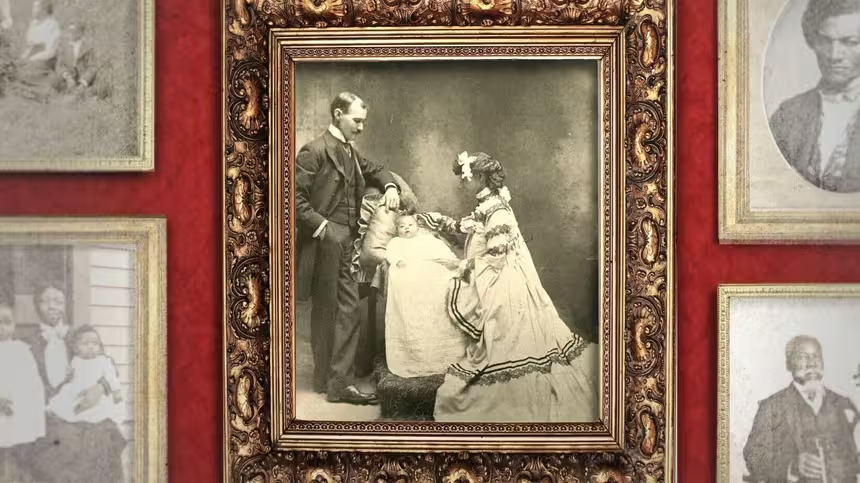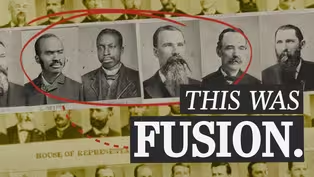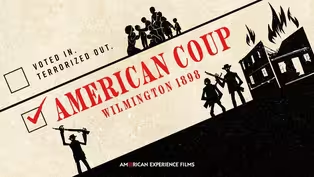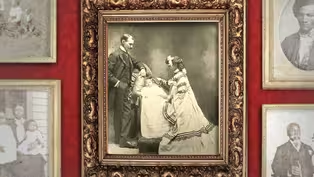
Chapter 1 | American Coup: Wilmington 1898
Preview: Season 36 Episode 7 | 8m 24sVideo has Closed Captions
Watch a preview of American Coup: Wilmington 1898
Watch a preview of American Coup: Wilmington 1898
Problems playing video? | Closed Captioning Feedback
Problems playing video? | Closed Captioning Feedback
Corporate sponsorship for American Experience is provided by Liberty Mutual Insurance and Carlisle Companies. Major funding by the Alfred P. Sloan Foundation.

Chapter 1 | American Coup: Wilmington 1898
Preview: Season 36 Episode 7 | 8m 24sVideo has Closed Captions
Watch a preview of American Coup: Wilmington 1898
Problems playing video? | Closed Captioning Feedback
How to Watch American Experience
American Experience is available to stream on pbs.org and the free PBS App, available on iPhone, Apple TV, Android TV, Android smartphones, Amazon Fire TV, Amazon Fire Tablet, Roku, Samsung Smart TV, and Vizio.
Buy Now

When is a photo an act of resistance?
For families that just decades earlier were torn apart by chattel slavery, being photographed together was proof of their resilience.Providing Support for PBS.org
Learn Moreabout PBS online sponsorship♪ ♪ CAROL ANDERSON: The story of the Wilmington coup is so important for American history.
♪ ♪ ALFRED MOORE WADDELL (dramatized): Men, the crisis is upon us.
You must do your duty.
This city, county, and state shall be rid of Negro domination once and forever.
You are the sons of noble ancestry.
You are Anglo-Saxons.
You are armed and prepared.
LUCY MCCAULEY: It was never discussed.
Nobody told us anything about what had happened in our own town.
I remember there sort of being whispers, talking about a race riot.
MAN (dramatized): "We, the undersigned, "citizens of the city of Wilmington "and County of New Hanover "do hereby declare that we will no longer "be ruled and will never again be ruled by men of African origin."
KIERAN HAILE: It wasn't talked about, it was deliberately covered up.
We still have to contend with 120 years of silence and fear.
FRANK ARTHUR DANIELS: Why has North Carolina buried and avoided this story?
We always bury the things that we're ashamed of.
DAVID ZUCCHINO: It was the only armed overthrow of an elected government.
Black citizens were murdered with impunity.
No one was ever held accountable or held responsible.
PEYTON HOGE (dramatized): We have taken a city as thoroughly, as completely as if captured in battle.
It has been redeemed for civilization, redeemed for law and order, redeemed for decency and respectability.
ANDERSON: This was a coup based on the devaluation of African American citizenship.
What Wilmington tells us in that larger scope of American history is how fragile American democracy is.
♪ ♪ WOMAN: ♪ Mother, my dear mother ♪ ♪ What rapture did you feel?
♪ ♪ Your daughter smiling in your arms ♪ ♪ Just after the repeal ♪ ♪ First-born out of slavery ♪ ♪ Your hopes to me affixed ♪ ♪ Newborn cries sweet lullabies ♪ ♪ So long ago in 1866 ♪ ♪ Lashes still stinging, yet your songbird bringing ♪ ♪ The life that salvation redeems ♪ ♪ Echoes still ringing, but your sunshine singing ♪ ♪ Of freedom no longer in dreams ♪ ROBIN KELLEY: In the years after the Civil War, we have the end of chattel slavery as we know it.
Four million people formerly held in bondage are now citizens.
They have the marks of the lash on their backs, and they settle in this city that's on the rise.
ANDERSON: The best way to understand Wilmington is to understand that coming out of the Civil War, you have Reconstruction.
♪ ♪ KIDADA WILLIAMS: Reconstruction was the process by which the nation tried to come to terms with the end of slavery and the end of the Civil War, to bring the seceded states back into the Union and to try to make good on the promises of the original founding by integrating newly freed African Americans more fully into the nation.
The end of slavery means that they can have access to their families, that they can work and get... be paid for it.
That they can have schools, that they can have churches, their own businesses, land.
A lot of historians have likened it to a second American Revolution.
Before 1898, Wilmington exemplified the spirit of Reconstruction.
Wilmington was the state's largest city.
LERAE SIKES UMFLEET: As one of the few open ports for international travel and traffic in North Carolina, this was a very prosperous city.
The railroad system drove back country items straight into the port in Wilmington and then out into the rest of the world.
So tar pitch and turpentine, the things that came from the forests of North Carolina, really drove some of this economy.
The Sprunt Cotton Compress here in Wilmington, they were one of the largest exporters of cotton in the world by this time.
KELLEY: Wilmington was one of those important centers for newly freed people to find opportunity.
There was really no other major city in the South like Wilmington.
First of all, it had a majority Black population of 56%.
SANDERS: They have the opportunity to compete with whites for well-paying jobs for both skilled and unskilled labor.
So we see African Americans working as brick masons, blacksmiths, carpenters.
ANDERSON: You have folks who are stevedores working on the docks.
You're having the Black leadership that have college degrees.
There was a professional class there of doctors and teachers and lawyers.
You've got the array of hardworking Black folk, up and down the class line.
It was a real community.
♪ ♪ ZUCCHINO: One interesting aspect of Wilmington was that Blacks sold items at the city market downtown alongside whites.
And this was highly unusual.
SANDERS: They are operating on terms of equality.
White vendors are having to compete with Black vendors for customers.
And one of the most prominent Black businessmen in the 1890s was a man by the name of Isham Quick.
My name is Inez Campbell-Eason.
I am the great-great-granddaughter of Isham Quick.
He was born in 1843.
At the end of slavery, he sojourned up to North Carolina, ended up in Wilmington.
He was a wood and coal dealer at the time.
He also chartered a Black-owned bank called the Metropolitan Trust Company.
This was quite significant, that African Americans had not only began to acquire large sums of money, but that they were able to invest them in Black banks.
We see large numbers of Black business owners, large numbers of Black homeowners.
Wilmington is essentially a promised land for African Americans.
♪ ♪ WOMAN: ♪ The ladies and gentlemen ♪ ♪ Stroll down the old Broadway ♪ ♪ Resplendent, transcendent ♪ ♪ They took your breath away.
♪ ♪ ♪ UMFLEET: The Sadgwar family in Wilmington went back generations.
SANDERS: They were one of the most prominent Black families in Wilmington.
Frederick Sadgwar was a renowned carpenter, providing cutting-edge construction services to both Black and white residents here in Wilmington.
These are civic-minded people.
They're involved in their churches.
They are raising these extraordinary families of children who go off to be educated as soon as that becomes possible.
There is this deep soil of Black cultural achievement here in Wilmington.
The coalition that challenged white supremacy in the Old South.
Video has Closed Captions
Clip: S36 Ep7 | 3m 32s | Just decades after the Civil War, a multi-racial political alliance won control of North Carolina. (3m 32s)
Trailer | American Coup: Wilmington 1898
Video has Closed Captions
Preview: S36 Ep7 | 2m | The little-known story of the deadly 1898 race massacre and coup d’etat in Wilmington, NC. (2m)
When is a photo an act of resistance?
Video has Closed Captions
Clip: S36 Ep7 | 2m 58s | Beautiful, intimate photographs of a society in the crosshairs of white supremacy. (2m 58s)
Providing Support for PBS.org
Learn Moreabout PBS online sponsorshipSupport for PBS provided by:
Corporate sponsorship for American Experience is provided by Liberty Mutual Insurance and Carlisle Companies. Major funding by the Alfred P. Sloan Foundation.




















